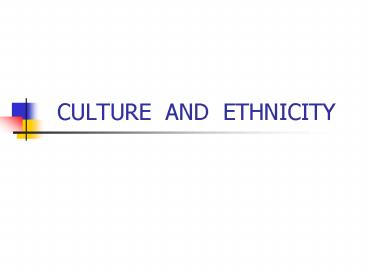CULTURE AND ETHNICITY - PowerPoint PPT Presentation
1 / 12
Title:
CULTURE AND ETHNICITY
Description:
Beliefs and values about prevention of illness, treatments, health care system. ETHNICITY ... People of different cultures and ethnicity can belong to the same ... – PowerPoint PPT presentation
Number of Views:393
Avg rating:3.0/5.0
Title: CULTURE AND ETHNICITY
1
CULTURE AND ETHNICITY
2
CULTURE
- Beliefs, values and practices (patterns of
behaviour) that are shared by a group of people
and passed down from generation to generation - Practices related to birth, becoming an adult,
marriage, death - Beliefs and values about prevention of illness,
treatments, health care system
3
ETHNICITY
- Persons ancestral roots shared past
- State of belonging to a group that is
differentiated from others by symbolic markers
(culture, territory, religion) - May contain different cultures
- British, French, German, Italian, First Nations,
Chinese - Ethnic background or ethnic origin
4
RACE
- Classification of people according to physical or
biological traits, such as skin colour, facial
features, bone structure, hair texture - Black, Asian, Caucasian
- People of different cultures and ethnicity can
belong to the same race
5
MULTICULTURALISM IN CANADA
- Complex issue
- Promoting and accepting different cultures
- Tolerance and diversity is part of Canadian
society - Only country in the world to have a national
multiculturalism law - Multiculturalism Act (1988) racial and cultural
equality protected by law
6
CULTURE SHOCK
- Disoriented or unable to respond to a different
cultural environment - Environment is unfamiliar, strange, and
incompatible with expectations - Occurs when one is suddenly moved to a different
culture or setting - Reactions silence, immobility, agitation
- Examples??
7
Characteristics of Cultures
- Learned from birth life experiences
- Taught verbal and non-verbal means
- Social - develops through interactions
- Adaptive dynamic and changing
- Satisfying persists to meet needs
- Difficult to articulate
- Exists at many levels material and abstract
8
CULTURAL COMPETENCE
- Knowing, utilizing, and appreciating the culture
of another in assisting with the resolution of a
problem - (DeSantis Lowe, 1992, p.1)
9
To become culturally competent, nurses must
- Be aware of own cultural beliefs, values
- Become aware of clients culture as they describe
it - Develop care plans with clients that consider
their cultural beliefs - Avoid stereotyping clients by cultural norms
individualized care - Look at people as individuals
- Allow caring to guide actions
10
Being culturally sensitive
- Address clients by last name
- Introduce yourself with your full name
- Be honest about lack of knowledge of their
culture - Use culturally sensitive language ask what term
they prefer - Explore what the client knows about their health
problem - Do not make assumptions ask
- Respect beliefs and practices of client and their
family
11
Cultural Parameters for Nursing
- Health beliefs and practices
- Family patterns
- Communication style
- Space orientation
- Time orientation
- Nutritional practices
- Pain responses
- Death and dying practices
12
Leiningers Model for Cultural Awareness
- Madeline Leininger nursing leadership regarding
culture and nursing - Defined transcultural nursing
- Sunrise Model theory of cultural care































